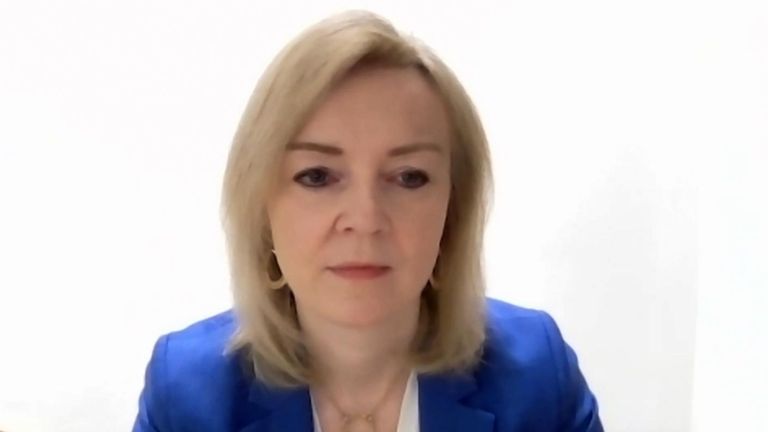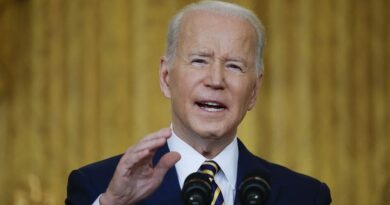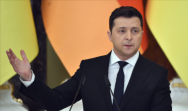COVID-19: Irish PM says EU was ‘blindsided’ by ‘nasty’ vaccine row and Brexit border arrangement became ‘collateral damage’
Northern Ireland’s post-Brexit border arrangements became “collateral damage” in the EU’s “nasty row” over COVID vaccines, Ireland’s prime minister has said.
Micheal Martin claimed EU officials were “blindsided” by the bloc’s dispute with drugmaker AstraZeneca when they acted to override part of the Brexit agreement, risking a hard border on the island of Ireland.
Amid an outcry from the UK, Northern Ireland and the Republic of Ireland, Brussels has since U-turned and abandoned its attempt to trigger Article 16 of the Northern Ireland Protocol.
The EU’s move came just four weeks after the Protocol came into force and followed years of efforts to ensure Brexit did not lead to the creation of a hard border between Northern Ireland and the Republic of Ireland.
Mr Martin urged all parties to now work together “to make sure something like this doesn’t happen again” and to ensure the Protocol “works effectively and efficiently for all concerned”.
“The context was very clear, it was the ongoing row with AstraZeneca and its failure to fulfil its commitments to the EU in relation to their vaccine supply and to meet their commitments in a timely fashion,” he said.
“The Commission were seeking transparency over their product.
“It’s a nasty row, it’s an acrimonious one over the last week and I think people were focused on that issue and the Protocol became collateral damage, which was wrong and it was very unfortunate.”
The Taoiseach suggested that those responsible for the Article 16 move were “blindsided completely” by the EU’s row with AstraZeneca, who recently told Brussels the initial number of doses it could supply to the bloc would be lower than first thought, due to manufacturing issues.
But Mr Martin denied the EU was guilty of a hostile move in seeking to control the export of coronavirus vaccines from the EU into Northern Ireland, as has been suggested by Northern Ireland’s First Minister Arlene Foster.
He said: “It certainly wasn’t a hostile act because, to be fair to the Commission – and, indeed, the EU member states – from the outset of the Brexit debate and post-referendum, they had real genuine interest in upholding and supporting the Good Friday Agreement and making sure that would be underpinned by whatever arrangements would emerge after Brexit.
“Hence the Protocol, hence the Withdrawal Agreement, which basically allows for seamless economic activity on the island of Ireland.”
The Taoiseach added there were “clearly lessons to be learned” from the Article 16 row, but he denied the threshold had now been lowered for either side to trigger the mechanism in future.
“It was reversed very quickly and that’s the key point here,” he said.
“Clearly the threshold was never meant to be the issue that prevailed on Friday.
“But the reversal of the decision I think illustrates the degree to which people realised very, very quickly that this was the wrong way to go and this was inconsistent with the Protocol and the application of Article 16.
“That’s the point really that I take some solace from.
“It’s a reminder for all concerned – and I think the Commission understands this as well and accepts this – that the antennae need to be sharper in terms of the challenges and the sensitivities within Northern Ireland politics that Brexit has created.”
Subscribe to the Daily podcast on Apple Podcasts, Google Podcasts, Spotify, Spreaker
Earlier on Sunday, International Trade Secretary Liz Truss called on world leaders to resist “vaccine nationalism” and “protectionism” following the development of COVID jabs.
“We’re pleased the EU admitted the Article 16 invocation that was talked about for the border with Ireland was a mistake and they are now not proceeding with that,” she told Sky News’ Sophy Ridge on Sunday show.
“But fundamentally, the way we are going to get through this crisis is working together.”
Former Labour prime minister Tony Blair said the EU was “very foolish” in triggering Article 16.
Source: Read Full Article




